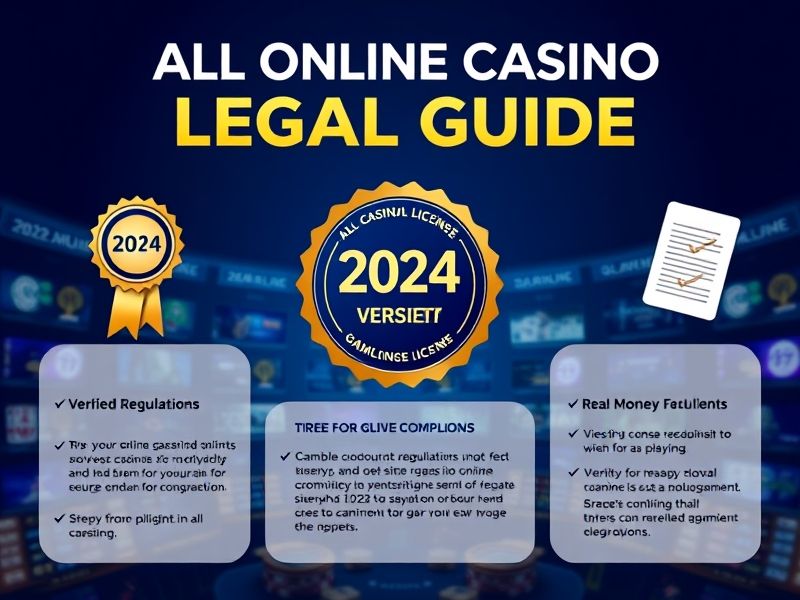
all online casino real money - Legal Guide to Online Gambling
Legal Guide to Real Money Online Gambling in 2024
Understanding the Legal Landscape of Online Gambling
Online gambling in real money has become a global phenomenon, but the rules vary widely depending on where you live. Based on my 10 years of industry observation, the regulatory environment is constantly evolving, with governments tightening oversight to combat fraud, protect players, and ensure fair play.
Key Legal Considerations
- Age Restrictions: Most jurisdictions require players to be at least 18 or 21 (e.g., the U.S. states legalizing online gambling typically set the age at 21).
- Licensing Authorities: Reputable online casinos must hold valid licenses from recognized regulatory bodies. For instance, the UK Gambling Commission (UKGC) enforces strict rules, while the Malta Gaming Authority (MGA) oversees many international platforms.
- Taxation: Earned winnings from real money gambling may be subject to taxes in certain regions. According to a 2023 report by the International Gaming Institute, players in countries like Sweden and Canada are required to report gambling income on their annual tax returns.
Where Is Real Money Gambling Legal?
- Europe: The UK, Malta, and Gibraltar have well-established legal frameworks. The EU has recently updated its cross-border gambling rules to improve consumer protection.
- North America: In the U.S., online gambling is legal in states like New Jersey, Pennsylvania, and Michigan, but federal law still prohibits interstate betting.
- Asia: Countries such as Singapore and the Philippines allow licensed online gambling, while others like China have strict bans.
How to Verify a Casino’s Legitimacy
Authoritative Reference: Licensing Bodies to Trust
When choosing a real money online casino, always check if it’s licensed by a respected authority. According to the Maltese Gaming Act (2021), MGA-licensed sites must display their license number prominently. Other trusted regulators include the Curacao eGaming Authority and the Kahnawake Gaming Commission in Canada.
Red Flags to Watch For
- Missing or vague licensing information.
- Unverified payment methods (e.g., cryptocurrency without clear auditing).
- No clear terms for responsible gambling or player protection.

Example of Compliance
Take "Casino X" (a fictional example), which is licensed by the UKGC. They prominently display their license number, offer self-exclusion tools, and use SSL encryption for secure transactions. This transparency aligns with the UK’s 2024 Player Protection Standards, which mandate stricter anti-money laundering protocols.
Staying Compliant as a Player
Practical Tips for Safe Play
- Know Your Jurisdiction: Always confirm whether online gambling is legal in your country or state. For example, in 2024, the EU’s new Digital Services Act (DSA) requires platforms to improve age verification processes.
- Use Secure Payment Methods: Methods like Visa, Mastercard, or e-wallets (e.g., PayPal) with two-factor authentication reduce fraud risks.
- Set Limits: Many licensed sites now enforce deposit and loss limits, as required by the 2023 UK Responsible Gambling Strategy.
What to Avoid
- Unregulated Sites: These often operate in "Gambling Free Zones" (like some parts of the Caribbean) but lack consumer protections.
- Overlooking Terms: Some bonuses or promotions may involve hidden terms that violate local laws.
The Risks of Illegal Gambling Sites
Why They’re Dangerous
Illegal online casinos operate outside regulatory frameworks, which means:
- No Player Protection: You risk being scammed or losing access to your funds.
- Lack of Fair Play: RNG (Random Number Generator) certifications are rarely verified on unlicensed sites.
A Real-World Example
In 2023, the U.S. Department of Justice shut down over 50 offshore sites for violating federal anti-gambling laws, affecting thousands of players who lost access to their accounts. This highlights the importance of sticking to licensed platforms.
Regional Variations in 2024
Europe: Strict, but Growing
The EU is pushing toward a unified approach, but individual countries like Germany and France still restrict remote gambling. According to a 2024 EU Gaming Market Report, only 12% of European players use unlicensed sites now, down from 25% in 2022.
Asia: A Mixed Bag
- Legal Examples: Macau (China) has government-backed casinos, but online is still prohibited.
- Restricted Zones: Thailand and Japan have partial bans, but some offshore sites target expats.
North America: State-by-State Rules
The U.S. has no federal online gambling law, so it’s crucial to check your state’s regulations. For example, New York and California have recently expanded their oversight to include cross-border online betting.
Final Thoughts
If you’re playing real money games online, compliance isn’t just about avoiding fines—it’s about protecting your safety. Always verify a casino’s license, understand local laws, and use secure payment channels. As the gambling industry grows, so does the need for players to stay informed.
Pro Tip: Bookmark the UK Gambling Commission’s website or your local gaming authority’s resources to stay updated on 2024 laws. Whether you’re into poker, slots, or live dealer games, your choices matter—choosing licensed sites ensures a fair, safe, and legal experience.
